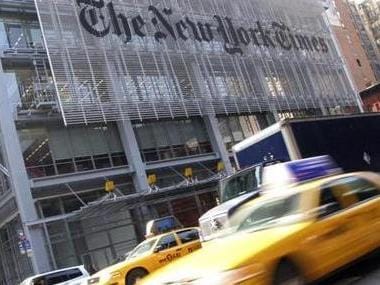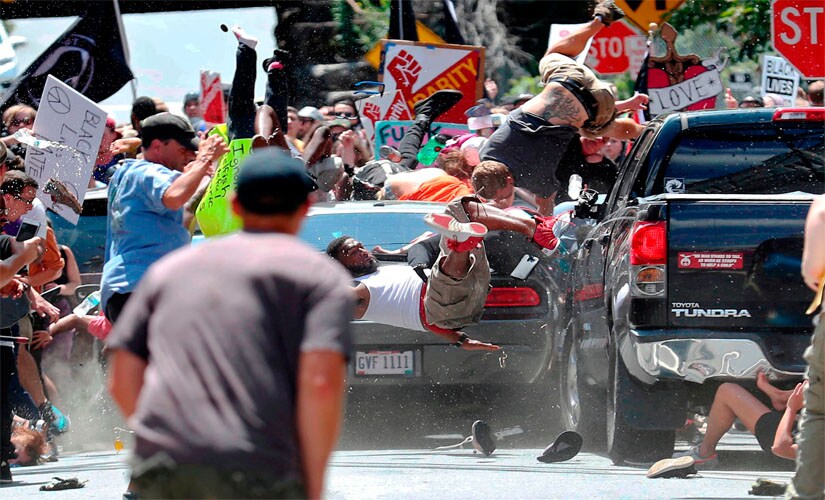The winners of the Pulitzer Prizes in journalism and arts were announced on Monday at New York's Columbia University. Several journalists were awarded recognition for their stories highlighting sexual harassment at the workplace, Russia's alleged meddling in the 2016 United States presidential election and the Rohingya crisis among other issues.
Pulitzer administrator Dana Canedy, the first black woman to present the awards began the announcement by saying that “The journalism categories yet again uphold the highest purpose of a free and independent press, even in the most trying of times” and indicated that, “These courageous, inspiring and committed journalists and their news organisations are undaunted in their mission in support of the Fourth Estate.”
"It is a mandate that has been under a seemingly relentless assault of late but that remains central to a healthy democracy," she added.
Here is a look at some of the winners and their contribution:
The New York Times and The New Yorker
The New York Times and The New Yorker were awarded the Pulitzer Prize for public service for stories about disgraced movie mogul Harvey Weinstein and other powerful men who have been accused of sexual harassment and abuse. The citation noted that the reporting by the Times' Jodi Kantor and Megan Twohey and Ronan Farrow of The New Yorker had spurred "a worldwide reckoning about sexual abuse of women."

A file photo of the New York Times office. Reuters
The prestigious prize was awarded to the Times team led by Jodi Kantor and Megan Twohey and New Yorker contributor Ronan Farrow, for reports that disgraced the Hollywood mogul and sparked an avalanche of accusations against other powerful men.
Since the Times and New Yorker articles last October, more than 100 women have publicly accused the producer of misconduct ranging from sexual harassment to rape, sparking the #MeToo movement that has seen a string of influential men lose their jobs and reputation.
Weinstein's marriage has ended, he has been under police investigation in London, Los Angeles and New York, hit by a litany of civil lawsuits and his former production company has been forced to file for bankruptcy.
Farrow, 30, is the son of actress Mia Farrow and film director Woody Allen, and something of a prodigy who has previously fronted his own television show, worked in Afghanistan and Pakistan for late US diplomat Richard Holbrooke, and formerly advised then Hillary Clinton on global youth issues when she was secretary of state.
The former Rhodes scholar, who graduated from Yale Law School at just 21, has sided with his sister Dylan's claims that Allen molested her when she was seven. Allen has repeatedly denied the allegations.
"So so so proud," tweeted Mia Farrow minutes after her son's award was announced.
Ronan Farrow paid tribute to his co-winners and The New Yorker. "This moment gets called a reckoning, but we just started telling the truth about old abuses of power. Thanks to all who keep doing so," he wrote on Twitter to his nearly half a million followers.
The Washington Post
The Washington Post was awarded the Pulitzer Prize in the investigative category for relentless reporting seen as having influenced the outcome of the 2017 Senate race in Alabama, revealing Republican candidate Roy Moore's alleged past sexual harassment of teenage girls.
The Republican former judge denied the accusations, but they figured heavily in Doug Jones' victory as the first Democrat elected to the Senate from the state in decades.
The New York Times and The Washington Post also shared the national reporting prize for furthering understanding of Russian interference in the 2016 election, and the connections between Russian actors and the Trump campaign, his transition team and administration, Canedy said.
The first carried a story in the summer of 2016 that Russian agents had been involved in the hacking of the Democratic National Committee. The paper gave readers an inside-view into the US government's decision-making response to the alleged Russian meddling in the 2016 election in a detailed 7,000-word article, drawing on months of extensive reporting and interviews with nearly three dozen officials.
Acknowledging the award, The New York Times detailed some of its work covering the 2016 election scandal saying, "When The Times approached the White House in July 2017 with knowledge of a secret meeting during the 2016 campaign between Russians and top advisers to Donald J. Trump, the administration put out a false statement, saying the meeting was set up to discuss Russian adoptions. But continued digging showed Moscow had offered compromising information on Hillary Clinton, and that the Trump campaign was eagerly interested in the information. The special counsel, Robert S. Mueller III, learned of the meeting’s true purpose from The Times, prompting him to investigate further."
Reuters
The Pulitzers, the most prestigious awards in American journalism, recognised Reuters in international reporting for exposing the methods of police killing squads in Philippines President Rodrigo Duterte’s war on drugs, and for feature photography documenting the Rohingya refugee crisis in Myanmar and Bangladesh.
“In a year in which many Pulitzers were rightly devoted to US domestic matters, we’re proud at Reuters to shine a light on global issues of profound concern and importance,” Reuters Editor-in-Chief Stephen J. Adler said.
It was the first time Reuters has won two prizes in one year.
In the Philippines coverage, Reuters reporters Clare Baldwin, Andrew RC Marshall and Manuel Mogato “demonstrated how police in the president’s ‘drug war’ have killed with impunity and consistently been shielded from prosecution,” Adler said.
The coverage included a report that revealed how a police anti-drug squad on the outskirts of Manila had recorded an unusually high number of killings. Many members of the squad came from a distant place that was also Duterte’s hometown, where the campaign’s brutal methods originated during his time as mayor there.
The Reuters photography staff was honoured for images of the violence endured by the Rohingya, a Muslim minority, as they fled Myanmar for Bangladesh.
“The extraordinary photography of the mass exodus of the Rohingya people to Bangladesh demonstrates not only the human cost of conflict but also the essential role photojournalism can play in revealing it,” Adler said.
Reuters reporters Wa Lone and Kyaw Soe Oo have been jailed in Myanmar since 12 December, charged under the colonial-era Official Secrets Act, while investigating the killing of 10 Rohingya Muslim men in Rakhine state.
Ryan Kelly
Ryan M. Kelly won the Pulitzer Prize for breaking news photography for his “chilling image” of a car ploughing into a crowd of protesters in Charlottesville. The image was taken during Kelly's final assignment on his last day as a staff photographer at The Daily Progress.

The award-winning photo by Ryan Kelly
Kelly had been covering a white nationalist rally on 12 August when a car plowed into a crowd of counter-protesters, resulting in the death of one person and injuring 19 others who had been scrambling to escape being hit by the car when they were tossed about in the ensuing chaos.
In a first-person account for The Columbia Journalism Review, Kelly narrated the incident saying, “There were a few small fights that broke out from time to time. People were throwing stuff at each other. A few people were beating on each other. Eventually, I came across two large groups of people protesting against the ‘Unite the Right’ rally and they merged together on Water Street.”
“I edged over onto the sidewalk to get pictures, and right after I did, the car came screeching past me at speed, plowed into the crowd of protesters and immediately reversed back up the hill,” he wrote. “It turned, then took off. Out of instinct, I began taking photos. I just brought the camera to my eye and just mashed the shutter down. I was barely even aware of what I was watching until he was speeding into the crowd,” Kelly said.
Editor of The Daily Progress, Aaron Richardson, said the prize was “great recognition” of the work that Kelly and his colleagues had put in over the past year.
The Arizona Republic and USA Today Network
The Arizona Republic and USA Today Network received the award for explanatory reporting for multimedia reporting, including podcasts and virtual reality, that examined US President Donald Trump's proposal to construct a wall along the US-Mexico border.
USA Today noted, "The Wall: Unknown Stories, Unintended Consequences project, led by The Arizona Republic and involving more than 30 USA Today Network journalists from California, Arizona, New Mexico and Texas, won the Pulitzer for explanatory journalism. The project used virtual reality, aerial video, 360-degree video, documentary video, photos, podcasts and interactive maps — as well as more than a dozen stories — to examine and explain President Trump's complicated border wall proposal that spans 2,000 miles."
With inputs from agencies
Updated Date: Apr 17, 2018 14:47 PM